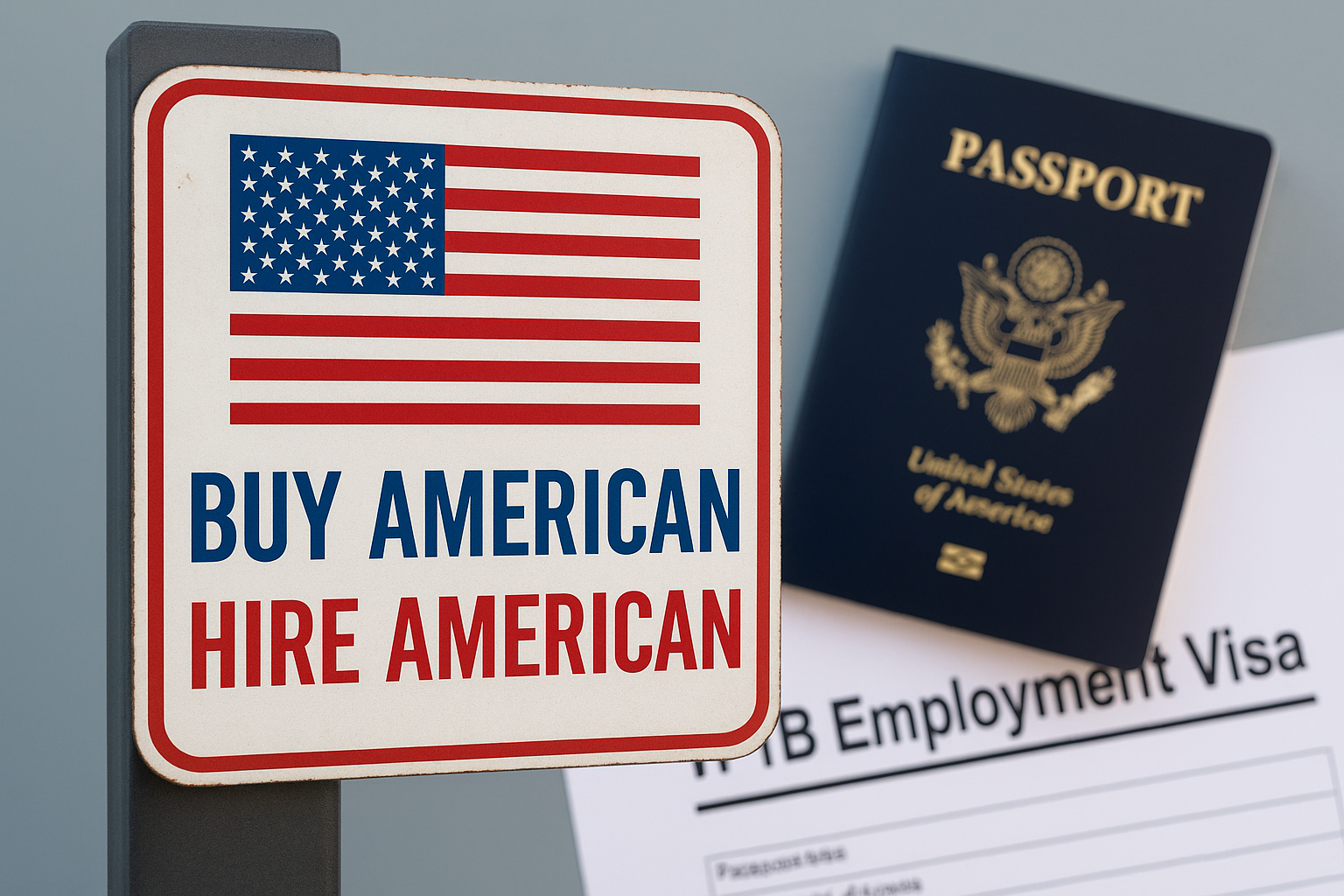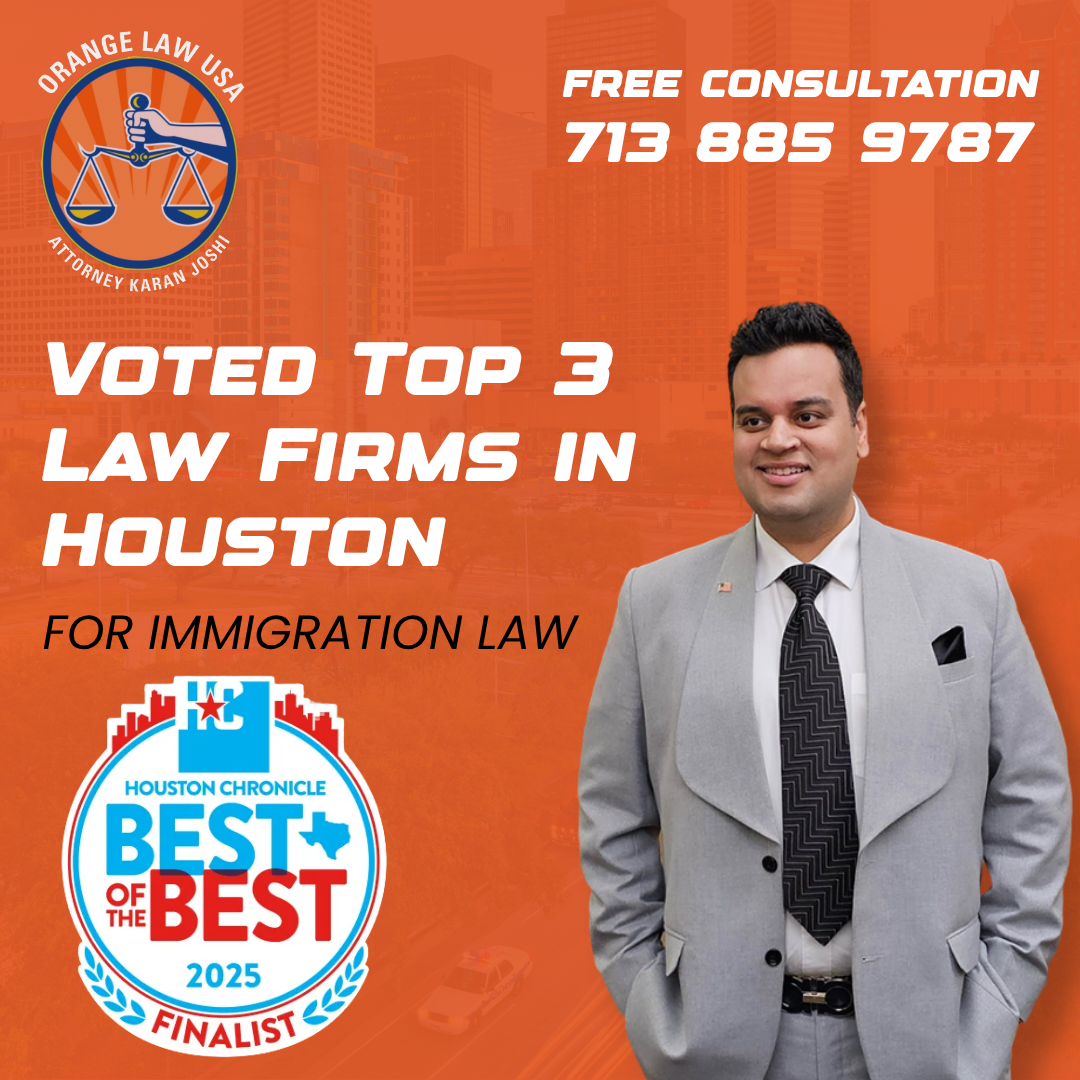The phrase “Buy American, Hire American” (BAHA) has had a lasting effect on the U.S. immigration system, especially for high-skilled professionals seeking an H-1B visa. First signed as an executive order in 2017, this policy shifted how U.S. Citizenship and Immigration Services (USCIS) reviews and processes Employment Visas, raising scrutiny levels and altering the approval landscape for employers and applicants alike.
Orange Law has helped many clients when they faced issues due to the strict rules of the H-1 B. We guided them to make their case strong. Here’s a look at how BAHA enforcement continues to influence H-1B visa petitions and what applicants must consider today.
What is “Buy American, Hire American”?
The executive order was intended to promote U.S. goods and prioritize American workers. In the context of immigration, BAHA pushed federal agencies to tighten enforcement on employment-based immigration programs. The H-1B visa, which allows US companies to hire foreign skilled professionals on a temporary basis, became the target of that policy.
Agencies began placing additional emphasis on:
- Higher wages for foreign workers
- Stronger documentation from sponsoring employers
- Prevention of perceived outsourcing or job displacement
- Compliance audits and stricter interpretations of eligibility criteria
As a result, Employment Visas—particularly H-1B petitions—faced higher scrutiny, more Requests for Evidence (RFEs), and increased denial rates in the years following the order.
How BAHA Changed H-1B Adjudication
Before BAHA, many H-1B applications were processed without extensive follow-up. But under this policy, USCIS took a more aggressive stance. To get the application approved, candidates had to provide complete documentation of job responsibilities, relation with the company, and “specialty occupation”.
Some of the key shifts included:
- More RFEs: USCIS began issuing RFEs asking for additional documents like contracts, project timelines, and educational justifications.
- Third-party placements under scrutiny: IT consultants working at client sites faced a higher burden of proof.
- Wage level focus: Preference was given to jobs offering higher wages, making it harder for Level 1 wage offers to be approved.
- No deference policy: Renewals and extensions no longer receive the benefit of doubt, even if the original H-1B had been approved.
After these policy changes, it became necessary for companies and professionals to make their Employment Visa petitions strong, with complete documentation.
Current Status of BAHA’s Impact on Employment Visas
While BAHA itself is no longer being actively enforced under the current administration, many of its changes have left a mark on H-1B processing standards. USCIS continues to apply some of the same standards introduced during BAHA’s peak, particularly when it comes to reviewing third-party work locations, verifying employer control, and ensuring the job qualifies as a specialty occupation.
For example:
- USCIS officers still request detailed itineraries and contracts for H-1B roles involving client-site work.
- Proof of advanced education and relevance to the job is strictly examined.
- Companies are expected to clearly define job responsibilities and reporting structures.
This means the legacy of BAHA enforcement still shapes how Employment Visas are evaluated today.
Challenges for Employers and Applicants
While filing for an Employment Visa, if the job details are not clear or solid proof of an employer-employee relationship is not given, then the chances of an H-1B getting rejected increase. That is why the documentation should be tight. For applicants, the need to present strong academic credentials aligned with the job has become more critical.
Some of the ongoing difficulties include:
- Denials based on improper job classification under the Department of Labor’s Occupational Outlook Handbook
- Rejections due to insufficient evidence of specialized knowledge
- Delays due to site visits or follow-up inquiries
- Difficulty in securing extensions under the current interpretation of Employment Visas rules
An experienced immigration legal team, like Orange Law, can identify weaknesses before they lead to denials and build a strong case from the beginning.
What Applicants Should Do Now
If you’re preparing an H-1B petition or dealing with an RFE or denial, you need a legal strategy that anticipates these scrutiny points. Our attorneys at Orange Law recommend the following:
- Gather complete academic and work-related documentation early
- Ensure the job role qualifies as a specialty occupation and matches the degree field
- Avoid vague titles or job descriptions—be specific and detailed
- For third-party placement, include contracts, work orders, and client letters
- Address wage level justifications clearly
- Be ready for compliance checks and audits
Having handled numerous Employment Visas cases, we know what USCIS looks for and how to meet their standards.
How Orange Law Can Help with H-1B Cases
Orange Law’s immigration attorneys take every client’s case seriously—whether it is a student or an employer—and provide proper legal support for H-1B and other Employment Visas. We:
- Review your job offer, degree, and supporting evidence
- Draft well-supported petitions to minimize RFEs
- Respond to RFEs with clear and timely documentation
- Assist in appealing denials or re-filing cases where appropriate
- Provide ongoing guidance for compliance and future renewals
The impact of BAHA enforcement means that even today, USCIS may look for reasons to deny weak or poorly prepared applications. That’s why working with experienced counsel can make the difference between approval and rejection.
Prepare Strong or Face Delay
Even though “Buy American, Hire American” is no longer headline policy, its enforcement history still influences the H-1B visa process. Every Employment Visas applicant must approach the process with preparation, clarity, and strong legal guidance.
If you’re planning to file a new H-1B petition or respond to a recent challenge, Orange Law is ready to help. Our team understands how to meet USCIS expectations and protect your opportunity to work in the U.S.
Reach out to Orange Law today to discuss your Employment Visas strategy with an experienced immigration attorney.






